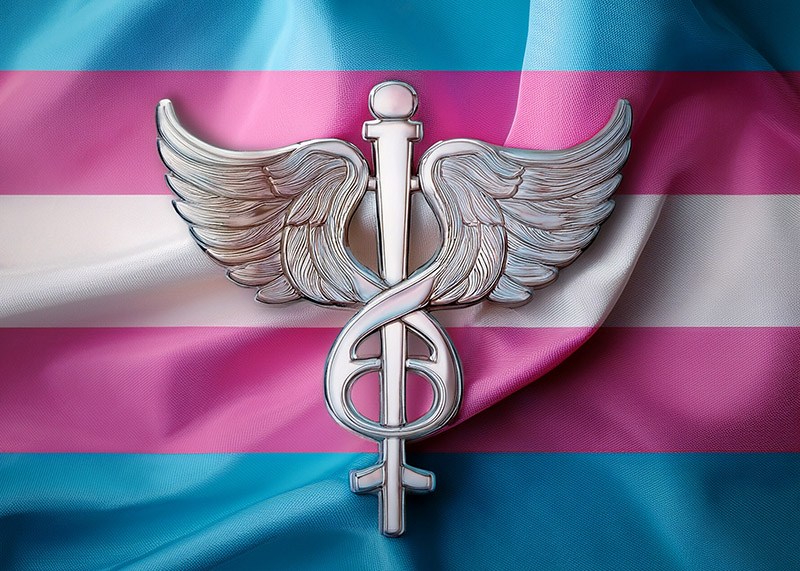North Carolina state employees sue state over health insurance exclusion on transgender care
State employees who are transgender or have transgender dependents claim exclusion is discriminatory

Several North Carolina state employees are suing the state over an exclusion in their employer-provided health insurance plan that does not cover any form transition-related health care, including counseling, hormone therapy, or gender confirmation surgery.
Lambda Legal and Transgender Legal Defense & Education Fund filed the lawsuit in U.S. District Court for the Middle District of North Carolina on behalf of seven current and former state university employees who are either transgender or have transgender children who were refused coverage for various treatments for gender dysphoria. In all cases, the treatments were designated as medically necessary by their health care providers.
The lawsuit, known as Kadel v. Folwell, argues that the insurance exclusion discriminates against the plaintiffs and their dependents on the basis of both sex and transgender status, thus violating the Equal Protection Clause of the U.S. Constitution, Title IX of the Education Amendments of 1972 — which prohibits discrimination against employees of institutions of higher learning — and Section 1557 of the Affordable Care Act, which prohibits discrimination on the basis of sex.
“[B]y categorically depriving transgender enrollees of coverage for the treatment of gender dysphoria — the clinically significant distress that can result from the dissonance between an individual’s gender identity and sex assigned at birth — Defendants unlawfully discriminate against people like Plaintiffs, who either are transgender or have transgender family members who depend on them for health care coverage,” the lawsuit states.
“In doing so, Defendants deny equal compensation for equal work to employees who are transgender or have transgender dependents, as well as harm employees’ transgender family members who depend on them for health care coverage.”
The lawsuit comes after years of back and forth battles over transgender rights in the state, most notably the anti-transgender bills HB 2 and HB 142, which sought to prevent localities from recognizing or passing protections for LGBTQ individuals.
In 2016, an independent consulting company advised state officials that the existing exclusion in the state employee insurance plan should be lifted in order to comply with Section 1557. The consultant also estimated that eliminating the exclusion would likely cost the state plan between $350,000 to $850,000, which amounts to 0.011% to 0.027% of the total premiums that the plan pays annually for medical and pharmacy coverage. The following year, state officials removed the exclusion from the state employee plan.
However, in 2018, newly-elected State Treasurer Dale Folwell — who is named as a defendant in the lawsuit — delivered on a campaign promise to eliminate coverage for any forms of transgender health care. As a result, a blanket exclusion was reinstated for plan years 2018 and 2019.
The plaintiffs claim this blanket exclusion is causing them significant harm, and in some cases, is forcing them to pay out of pocket for treatments that would otherwise be covered for cisgender employees.
“The only reason our plaintiffs are being denied coverage for medically necessary health care is because they are transgender or they have children who are transgender,” Lambda Legal Staff Attorney Taylor Brown said in a statement. “This is clearly unlawful discrimination that jeopardizes the health of hardworking state employees and their families. It stigmatizes them and brands them as second-class. I am a transgender woman, born and raised in North Carolina and an alumna of UNC-Chapel Hill. This kind of targeted discrimination is shameful to me personally and it does not represent the true values of this state or North Carolinians.”
“Revoking health insurance coverage for transgender employees puts the state of North Carolina on the wrong side of history,” Noah Lewis, a senior staff attorney for TLDEF, said in a statement. “North Carolina otherwise provides excellent health care benefits, so it’s a real betrayal to have the state unfairly turn its back on its own employees and their families who face pressing health care needs.”

One employee who was affected by the exclusion was Julia McKeown, an assistant professor in the College of Education at North Carolina State University. After being recommended for gender confirmation surgery, McKeown was denied coverage and was forced to pay $14,000 in out-of-pocket expenses.
“In 2018, I was finally in a position to move forward with surgical care, an important part of my transition,” McKeown said in a statement. “I did not expect I would have to raid my retirement and savings accounts for treatment prescribed by my doctors, when other state employees would be covered for the same procedures. It is demeaning and fundamentally unfair.”
Still another example is that of Michael Bunting, Jr., an employee of the University of North Carolina at Chapel Hill, whose 13-year-old transgender son, C.B., was prescribed and began taking puberty blockers in 2017 as part of his treatment for gender dysphoria, only to find out that the exclusion had been reinstated the following year. As a result, Bunting and his wife have had to purchase a second health care plan through the federal exchange in order to ensure the puberty blockers will be covered. That additional plan requires them to pay additional premiums on top of what they are already paying for Bunting’s employer-sponsored plan, and carries a deductible of $6,750 annually.
“Every dad wants to be able to ensure his child can get the medical care they need,” Bunting said in a statement. “It’s frustrating and disappointing to think that I work just as hard as any of my coworkers, but the coverage I receive for my family is not the same as theirs because my son is transgender.”
Support Metro Weekly’s Journalism
These are challenging times for news organizations. And yet it’s crucial we stay active and provide vital resources and information to both our local readers and the world. So won’t you please take a moment and consider supporting Metro Weekly with a membership? For as little as $5 a month, you can help ensure Metro Weekly magazine and MetroWeekly.com remain free, viable resources as we provide the best, most diverse, culturally-resonant LGBTQ coverage in both the D.C. region and around the world. Memberships come with exclusive perks and discounts, your own personal digital delivery of each week’s magazine (and an archive), access to our Member's Lounge when it launches this fall, and exclusive members-only items like Metro Weekly Membership Mugs and Tote Bags! Check out all our membership levels here and please join us today!




































You must be logged in to post a comment.